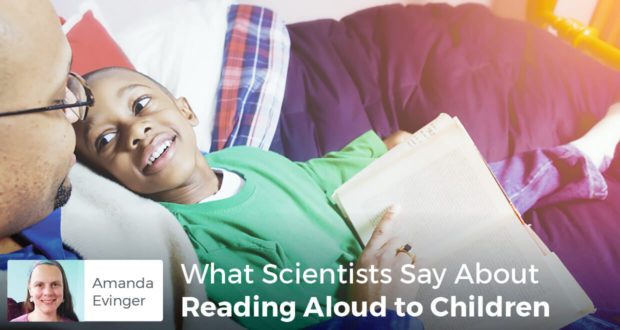Summary
Amanda Evinger, homeschooling Mom of four, shares scientific studies on the importance of reading aloud to one’s children and the ways it helps your kids.Sometimes, I get tired of “the books.” Oh, you know, seeing Catholic Treasure Box books (all 20 of them) making a landslide on the bookshelf, stubbing my toe on ridiculously heavy encyclopedias that weren’t put away, and trying to organize the chewed-on baby books that seem to nest and breed in our van. Sigh.
But, when it’s all said and done, I love books, and I treasure the moments I share them with my children. These times will — and very much are — make lasting memories of bonding with my children and giving them a God-honoring education that I’ll always hold dear in my heart.
When I cuddle and read something holy, informative or beautiful to my children, I feel at peace and I know I’m being a good Mom, despite my faults and sins.
And when I see my kids reading voraciously for pleasure (especially when it is a Saint book reminding them of a virtuous trait I’ve been trying to hammer into their cute little brains for years), I feel my husband and I are getting a “thumbs up” from Jesus. As homeschooling parents, we are blessed beyond measure to give this gift of reading to our children freely and creatively.
And I must say, from what I witness, many homeschooling parents are doing a tremendous job of taking advantage of this blessing (a friend of mine with nine children told me they are notorious for bringing a big laundry basket to the library to fill with great literature).
Recently, I did a little research to further inspire my New Year’s Resolution to read to my children more, and here are some of the goodies I found:
In a recent scientific study, published in the August 2015 issue of Pedriatics magazine (a publication of the American Academy of Pediatrics), researchers looked at the brains of Nineteen 3- to 5-year-olds using magnetic resonance imaging, or MRI.
They scanned the children’s brains while they listened to recordings of a woman reading stories, as well as while they listened to background noise, to see how their brains responded when faced with different kinds of stimulation.
The team also gathered information about how stimulating the children’s home reading environments were, such as regarding how frequently they were read to and whether they were exposed to a rich variety of books.
The MRIs revealed that children who came from more stimulating home reading environments had, in general, greater and higher activity in the parts of the brain that help with narrative comprehension and visual imagery. Interestingly, their brains especially showed this type of activity while they listened to stories being read to them.
The American Academy of Pediatrics has long spoken about the importance of reading at home throughout infancy and early childhood, explaining how it can improve language skills, foster literacy development, and much more.
“Parents who spend time reading to their children create nurturing relationships, which is important for a child’s cognitive, language and social-emotional development,” the AAP once said.
A second study I found discussed powerful research performed by Dominic Massaro, a professor emeritus in psychology at the University of California, Santa Cruz. His work showed that although parents can build their children’s vocabularies by talking to them, reading to them can be more effective, especially when the conversation in the home and vocabulary used is limited — which it usually is.
According to Massaro, “Reading aloud is the best way to help children develop word mastery and grammatical understanding, which form the basis for learning how to read.” He found that even picture books are two to three times more likely than parent-child conversations to include a word that isn’t among the 5,000 most common English words. Even adult conversations fail to match up to the rich vocabulary used in picture books.
Therefore, reading picture books to children would not only expose them to more words, he said, but it also would have a leveling effect on families with less education and a more limited vocabulary.
This is not to say that parent-child conversations aren’t extremely important for enriching family life.
Third, I discovered a website that paints a good picture of why the practice of reading aloud as a family is so critical.
“Reading aloud to young children, particularly in an engaging manner, promotes emerging literacy and language development and supports the relationship between child and parent,” concludes a review in the publication, Archives of Disease in Childhood, which is posted on the site.
It can also develop a child’s vocabulary, improve their ability to learn to read, and – perhaps most important – foster a lifelong love of books and reading.
As the website continues to share, Jim Trelease, author of the best-seller, The Read-Aloud Handbook writes, “Every time we read to a child, we’re sending a ‘pleasure’ message to the child’s brain. You could even call it a commercial, conditioning the child to associate books and print with pleasure.”
According to the site, “This reading “commercial” is critical when competition for a child’s attention is so fierce. Between television, movies, the Internet, video games and a myriad after-school activities, the pleasures of sitting down with a book are often overlooked. In addition, negative experiences with reading – whether frustrations in learning to read or tedious “skill and drill” school assignments – can further turn children off from reading.”
As believing parents, we know just how important it is to win our children’s hearts and capture their attention in a world where authentic Catholic faith is hard to find.
Conclusively, we see that science, and God, are on our side while we read great books to our kids!
So, the next time you get a bruised toenail from that monstrous encyclopedia of world history, do not dismay. Your efforts will bear beautiful fruit!

 Seton Magazine Catholic Homeschool Articles, Advice & Resources
Seton Magazine Catholic Homeschool Articles, Advice & Resources

